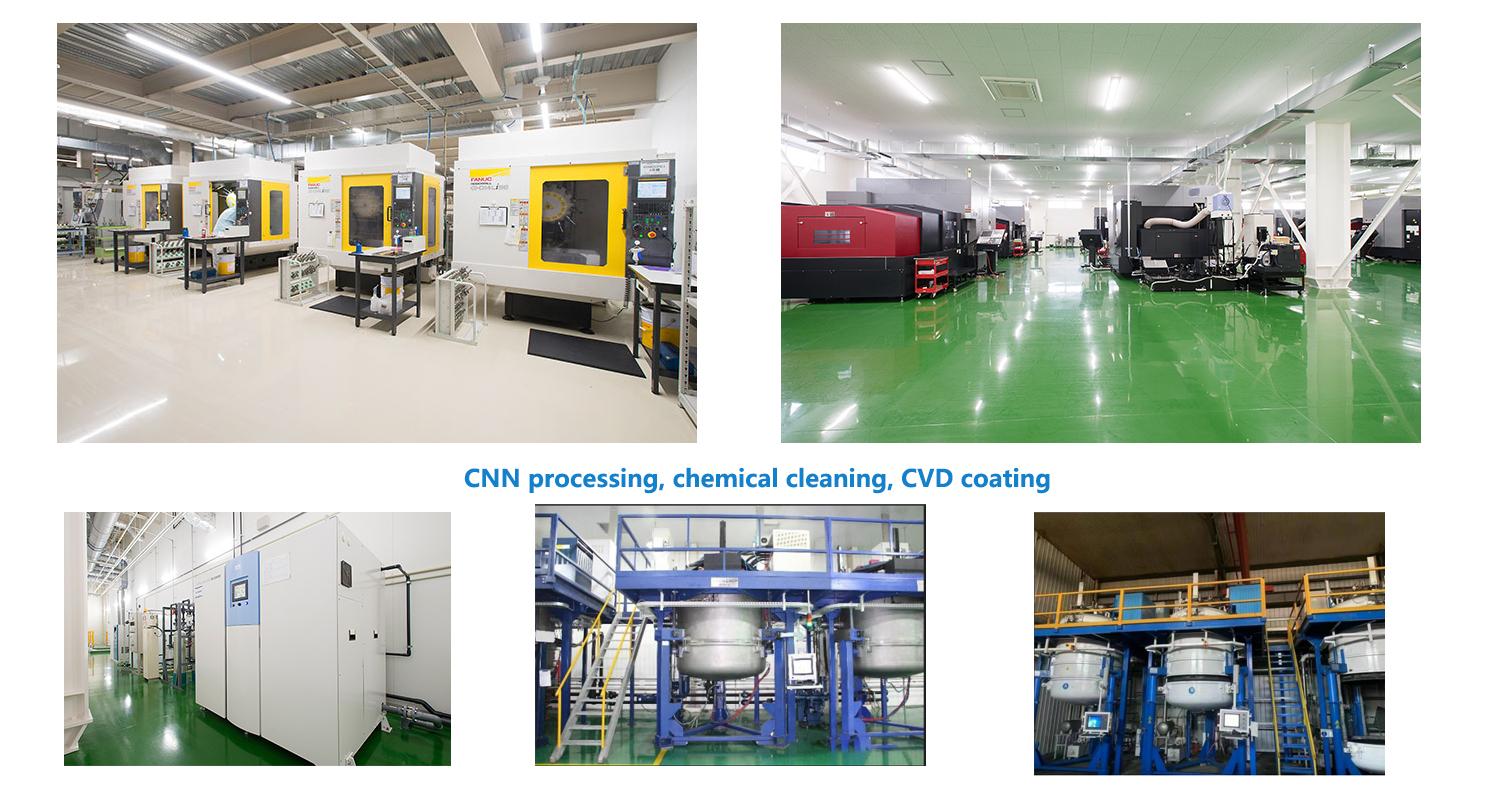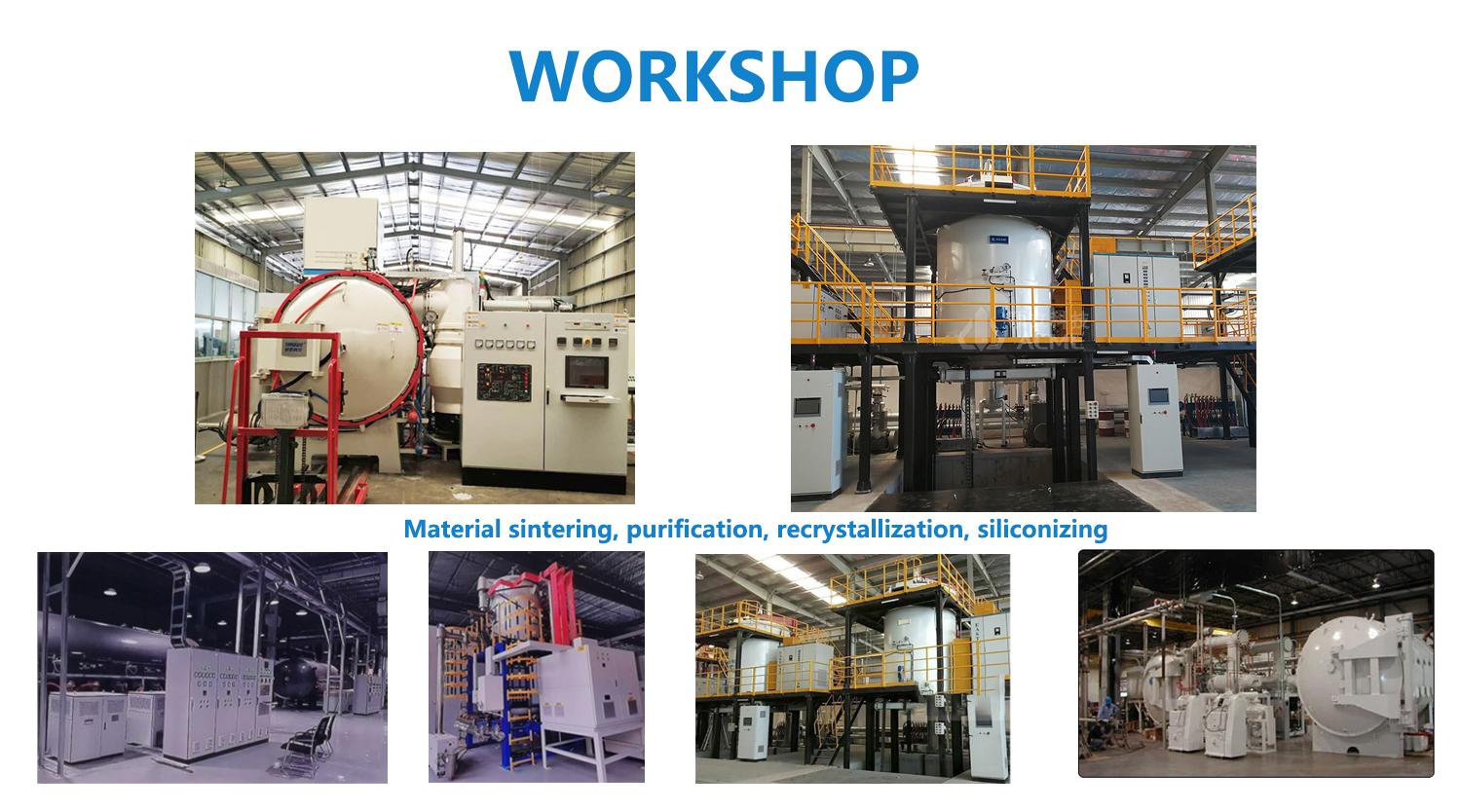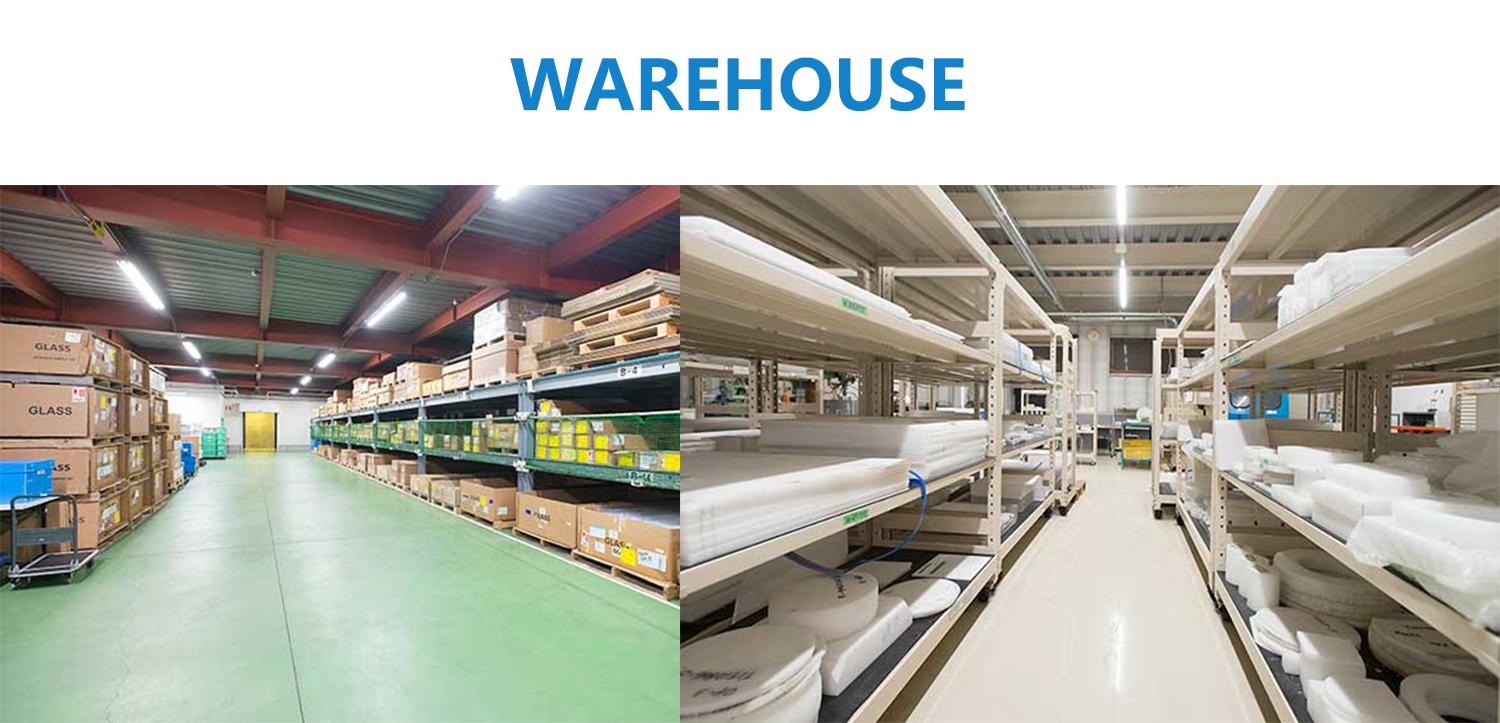
高熱産業用途に来るとき、, 焼結炭化ケイ素ロール 究極のソリューションとして際立っています。 耐摩耗性に優れた熱安定性や耐摩耗性など、先進的な特性がいかに重要であるかを見てきました。 Semiceraの反応焼結のようなこれらのロール シリコンカーバイドロール、従来の材料が失敗する企業のexcel.
独自の構成により、比類のないパフォーマンスが得られます。 例えば:
- 高い硬度、ダイヤモンドへの秒だけ耐久性を保障して下さい.
- 低熱膨張により、極端な温度下での変形が最小限に抑えられます.
- 優れた耐食性により、化学加工に最適です.
航空宇宙、原子力、機械、, 炭化ケイ素 一貫したアウトパーフォームの代替品をロールします。 過酷な条件下で整合性を維持する能力は、彼らがなぜであるかを証明します 最高の焼結炭化ケイ素ロール 本日は営業しております。 さらに、 sic coating パフォーマンスを高め、重要なアプリケーションでより信頼性を高めます.
要点
- 焼結炭化ケイ素ロール 非常に熱い条件でよく働かせて下さい.
- 1800°Cの高温でも強いまま.
- これらのロールは熱をすぐに移し、熱するとき非常に少し拡大します.
- これは機械がよりよく働かせ、より少ないエネルギーを使用するのを助けます.
- 彼らは非常に困難であり、 レジスト着用、長続きがする.
- これはより少ない固定およびより低い維持費を意味します.
- これらのロールは、航空機や化学物質などの業界に最適です.
- 厳しい状況や極端な状況でも対応可能です.
- これらのロールを使用して、時間をかけてお金を節約し、スマートな選択です.
焼結炭化ケイ素ロールの材料の特性
例外的な熱抵抗および熱安定性
高温環境で焼結した炭化ケイ素ロールのエクセルに感銘を受けました。 構造の整合性を失わない1800°Cまでの温度に耐える能力は、要求の厳しいアプリケーションのためのスタンドアウト選択をします。 他の材料とは異なり、それらは維持します exceptional thermal stability、急速な温度変化の下で。 このユニークな特性は、極端な熱が規範である化学加工や精製などの業界で一貫した性能を保証します.
優越性を強調するために、こちらは簡単な比較です
| プロパティ | 焼結炭化ケイ素 | その他の材料 |
|---|---|---|
| 高温抵抗 | お問い合わせ | クーポン |
| Thermal Shock Resistance | グレーター | 多くの場合、少ない |
| 機械安定性 | Excellent | 一般的に低い |
熱抵抗と安定性のこの組み合わせは、これらのロールは、重要なアプリケーションにおけるアウトパーフォームの代替品を保証します.
高い熱伝導性および低い熱拡張
焼結炭化ケイ素ロールの最も顕著な特徴の1つは、300 W/mKに近づく高い熱伝導です。 これにより、熱を効率的に転送し、迅速な熱放散を必要とするアプリケーションに最適です。 同時に、低熱膨張により変形が最小限に抑えられます.
このプロパティの残高が運用効率を向上する方法を最初に見てきました。 例えば:
- これらのロールは優秀な熱衝撃の抵抗による酸化アルミニウムを取り替える自動車水ポンプで使用されます.
- 高温での機械的特性を保持し、高熱環境での信頼性を保証します.
| Material Type | Thermal Conductivity (W/mK) |
|---|---|
| 焼結炭化ケイ素(CVD) | ~300 |
| その他の高性能材料 | 品種(通常下) |
航空宇宙や機械などの産業において、導電性・安定性の両立が欠かせません.
優秀な硬度および機械強さ
耐久性は、焼結炭化ケイ素ロールが輝きる別の領域です。 ダイヤモンドに2つ目の硬さは、重要な摩耗と涙に耐えることができます。 また、その機械的強度は比類せず、曲げ強度は400MPaに達し、圧縮強度は2200MPaまでです.
| プロパティ | 値(MPa) |
|---|---|
| 曲げ強度 | 400 |
| 圧縮強度 | 2200 |
これらの特性は、金属加工や鋳物などの高ストレス環境に理想的です。 優れた硬度と強度が維持コストを削減し、運用寿命を延ばす方法を見てきました。信頼性を要求する業界に長期的な価値を提供しました.
ハーシュ環境の腐食および耐久性
過酷な産業環境で作業する際には、腐食や摩耗による材料の故障がよく見えるようになりました。 これは、焼結炭化ケイ素が本当に輝きを転がすところです。 化学的攻撃や機械的劣化に対する優れた耐性は、化学加工、石油化学製品、金属加工などの業界で不可欠です.
焼結炭化ケイ素は腐食および酸化への驚くべき抵抗を表わします. . 強い酸やアルカリが存在する環境で確実に実行できます。 例えば:
- 耐水性酸、他のほとんどの材料を傷つける化学薬品への露出に抗します.
- 強い酸からの劣化に抵抗し、化学プロセスのバルブ部品に最適です.
- 酸化環境での耐久性は、高温用途での長期性能を保証します.
腐食抵抗のこのレベルが他の多くの材料と一致していないことに気付きました。 過酷な化学物質への継続的な曝露下でも、これらのロールは構造的完全性を維持します。 この信頼性は、機器の故障のリスクを軽減し、中断のない操作を保証します.
耐摩耗性は他の重要な利点です。 ダイヤモンドだけでなく、焼結炭化ケイ素は、形状や機能性を失うことなく、重要な機械的ストレスに耐えることができます。 これにより、鋳物や機械などの研磨材に関わる用途に最適です.
| プロパティ | 焼結炭化ケイ素 | その他の材料 |
|---|---|---|
| 耐食性 | Excellent | ポアへのモデレート |
| 耐摩耗性 | Superior | クーポン |
これらのプロパティは、ロールの寿命を延ばすだけでなく、メンテナンスコストを最小限に抑えます。 腐食と耐摩耗性を組み合わせて、効率性と費用効率性を両立させる産業のメリットを実感しました。 これは、常に厳しい環境のために焼結炭化ケイ素ロールをお勧めします理由です.
高熱環境でのパフォーマンス

1800°Cまでの温度での安定性と信頼性
私はどのように観察したか 焼結炭化ケイ素ロール 極度な熱のエクセル。 1800°C が他の材料から離れてそれらを置く高温で確実に作動する能力。 この安定性は99%炭化ケイ素の内容に含まれている独特な構成から来ます。 これらのロールは急速な温度変化の下で熱拡張の低い係数による変形に抵抗します.
パフォーマンスを記述するには、キーメトリックの分解は次のとおりです
| メトリック | バリュー |
|---|---|
| 炭化ケイ素の内容 | ≥99% |
| 高温抵抗 | 1800°Cの正常な使用 |
| High thermal conductivity | グラファイト材料と比較して |
| 高い硬度 | 第2回ダイヤモンドのみ |
| 耐食性 | タングステンカーバイドよりも優れています |
| ライト級選手 | 密度 3.10g/cm3 |
| 変形なし | 熱膨張の非常に小さい係数 |
| Thermal shock resistance | 迅速な温度変化に耐える |
このプロパティの組み合わせにより、これらのロールは、最も要求の厳しい環境であっても、構造的整合性とパフォーマンスを維持することができます.
熱伝達およびエネルギー保存の効率
産業用プロセスではエネルギー効率が極めて重要であり、焼結炭化ケイ素ロールが大きく貢献する様子を見てきました。 グラファイトに匹敵する優れた熱伝導性は、迅速かつ効率的な熱伝達を可能にします。 運用効率を向上するだけでなく、エネルギー消費を削減する機能です.
たとえば、これらのロールは、従来の窯の家具と比較して、少なくとも20%より多くのエネルギーを節約します。 軽量構造はローディング密度を高め、操作をより便利にします。 以下は、彼らの要約です 省エネの利点:
| Feature | Benefit |
|---|---|
| 優秀な熱伝導性 | 少なくとも 20% のエネルギーを節約して下さい 伝統的な窯の家具よりも |
| 耐久性の向上 | 窯の家具の耐用年数を延長して下さい |
| 軽量構造 | ローディング密度および操作上の便利を高めて下さい |
熱伝達を改善し、エネルギー廃棄物を減らすことによって、これらのロールは企業に費用節約および環境の利点の達成を助けます.
長寿とメンテナンスコストの削減
耐久性は、焼結炭化ケイ素ロールが輝きる別の領域です。 高い硬度と機械的強度により、摩耗や引き裂きを長時間防ぎます。 腐食および熱衝撃に対する抵抗が頻繁な取り替えの必要性を最小限にすることに気づきました.
この長寿は、メンテナンスコストを削減するために直接翻訳します。 業界は、修理や交換の少ないダウンタイムと低コストの費用から恩恵を受けています。 時間が経つにつれて、これらの節約は、焼結炭化ケイ素ロールを高熱用途の費用対効果の高い選択にします.
過酷な条件下で性能を維持できる能力は、長期にわたる信頼性を保証します。 効率と耐久性の両方を要求する業界を常にお勧めする理由です.
熱変動による一貫した性能
焼結型炭化ケイ素ロールが熱変動の扱い方に常に感銘を受けました。 多くの産業プロセスでは、急速な温度変化は材料をひび割れ、ゆがみ、または完全に失敗させる引き起こすことができます。 ただし、熱膨張係数の低いため、熱衝撃抵抗の極小な条件で転がります.
突然の温度変化に適応する能力は一貫した性能を保障します。 たとえば、温度が数分で低下したり、劇的に上昇したりできるキルンで使用しました。 他の材料とは異なり、変形なしで構造的整合性と機能性を維持します。 金属加工や化学加工などの産業に欠かせない信頼性です.
チップ: 焼結させた炭化ケイ素のような高い熱衝撃の抵抗の材料を使用して、急速な温度変化の間に装置の失敗の危険を減らします.
熱変動の下で他の材料を浸透させる理由は次のとおりです
- Low Thermal Expansion: : : これらのロールは、熱にさらされると最小限に拡大し、亀裂や歪みを防ぎます.
- High Thermal Conductivity: : : 熱を早く放散させ、不均等な温度分布によって引き起こされるストレスを軽減します.
- Durability: : : 硬度および強さは極度な熱周期の間に機械圧力に抗するを保障します.
| プロパティ | 焼結炭化ケイ素 | Traditional Materials |
|---|---|---|
| Thermal Shock Resistance | Excellent | ポアへのモデレート |
| 亀裂のリスク | ミニマル | 高い |
| パフォーマンスの一貫性 | Superior | パートナー |
これらのロールを使用して業界がダウンタイムを少なくし、メンテナンスコストを削減したことに気付きました。 熱変動の下で一貫して実行する能力は、作業効率を高めるだけでなく、機器の寿命を延ばすだけでなく、. そのため、常に焼結した炭化ケイ素ロールの信頼性と耐久性を必要とする高熱用途にお勧めしています.
Comparison with Other Materials
焼結炭化ケイ素ロール対鋼ロール
焼結型炭化ケイ素ロールを高熱用途の鋼ロールに比べることが多いです。 違いは印象的です。 鋼鉄ロールは、耐久、極端な環境で不足します。 焼結させた炭化ケイ素ロールは、一方、それらによるExcelを転がします 高度材料の特性.
パフォーマンスの速やかな分解は次のとおりです
- オファー 優秀な耐久性、研摩の条件の長寿を保障します.
- 熱安定性は鋼鉄を、1800°Cまでの温度の完全性を維持します.
- 高度な焼結技術は耐久性を高め、要求の厳しいアプリケーションに最適です.
| プロパティ | 焼結炭化ケイ素 | スチールロール |
|---|---|---|
| 耐摩耗性 | Higher | Lower |
| 熱安定性 | 詳しくはこちら | 中程度 |
| 耐食性 | Superior | Limited |
また、焼結型炭化ケイ素ロールは軽量で強度も高く、熱伝導性に優れ、熱膨張も低くなっています。 これらの特徴は、効率と信頼性を必要とする業界のためのより良い選択をします.
焼結炭化ケイ素ロール対その他のセラミック材料
焼結炭化ケイ素ロールを他の陶磁器材料と比較すると、その利点は明らかになります。 高い温度でも、比類のない硬度と機械的安定性を発揮します。 熱伝導性および低い熱拡張は変動条件の下で一貫した性能を保障します.
例えば、炭化ケイ素セラミックスは、冶金炉内の高温熱交換器で使用されます。 それらは作動します 1300°cまでの温度、他の陶磁器と比較される優秀な熱抵抗をdemonstrating。 さらに、腐食や酸化に対する抵抗は、過酷な環境でも欠かせません.
これらの特性は焼結させた炭化ケイ素ロールを離れて置きましたり、それらに宇宙空間、化学処理および金属加工のような企業のための好まれる選択をします.
コスト効果と長期的な価値
私は、焼結炭化ケイ素ロールが時間をかけて重要なコストメリットを提供する方法を見てきました。 とりあえず 長い寿命 頻繁な交換の必要性を減らし、ダウンタイムおよび関連コストを最小限に抑えます。 この耐久性は、生産性の向上と製造コストの低減につながります.
従来の材料と比較されて、これらのロールは競争価格で例外的な性能を提供します。 摩耗および引き裂きに耐える能力は長期節約を保障します。 メンテナンスコストを削減し、運用効率の向上に寄与する.
私の経験では、焼結させた炭化ケイ素ロールを選ぶことは信頼性および費用効果が大きいの投資です。 性能と耐久性により、高熱用途で価値ある資産を発揮します.
環境および操作上の利点
焼結型炭化ケイ素ロールは、環境の持続可能性と運用効率の両立に貢献する方法を常に高く評価しました。 先進的な材料特性により、廃棄物を削減し、生産性を向上させることを目指し、業界に優れた選択肢を発揮します.
重要な環境上の利点の1つは耐久性にあります。 これらのロールは鋼鉄のような従来の材料よりかなり長く持続します。 腐食および摩耗への彼らの高い抵抗は頻繁な取り替えのための必要性を最小にします。 素材の廃棄物を削減するだけでなく、新しいコンポーネントの製造に必要なエネルギーと資源を削減します。 私の経験では、この長寿はより少ない混乱とより持続可能な操作に翻訳します.
お問い合わせ: 焼結させた炭化ケイ素のような耐久材料を使用して企業は装置の寿命を拡張することによってカーボン フットプリントを減らすのを助けます.
操作上、熱伝導性や低熱膨張により、これらのロールは加速します。 極端な温度下でも形状と安定性を維持し、一貫した性能を保証します。 この信頼性がダウンタイムとメンテナンスコストを削減し、高熱環境で稼働する業界にとって重要な点がわかりました.
環境と運用上のメリットを強調するスタンドアウト機能は次のとおりです
- 高温での高硬度・機械的安定性
- 効率的な熱伝達のための優秀な熱伝導性
- 変形リスクを低減し、熱膨張係数が低い
- 腐食および酸化への高い抵抗、長期使用を保障します
これらの特性は焼結させた炭化ケイ素ロールを環境に優しい、費用効果が大きい解決作ります。 メンテナンスや交換を要する材料を選択することで、業務効率と環境の責任を両立させることができます。 パフォーマンスと持続可能性が等しく重要であるアプリケーションを常に推奨します.
焼結炭化ケイ素ロールの用途

産業炉および炉
焼結した炭化ケイ素は、工業炉や窯で転がる様子を見てきました。 極端な温度に耐え、熱衝撃に抵抗する能力は、高温環境に不可欠です。 これらのロールは特に有効です ローラーキルンの高温焼入れセクション. . 強烈な熱サイクルで安定した性能を発揮します.
私の経験では、建設用セラミックスやリチウム電池の生産などの業界は、これらのロールに大きく依存しています。 熱安定性および長寿は他の材料を、ダウンタイムおよび維持費を削減します。 以下は一般的なアプリケーションです
- ローラーキルンの高温焼入れセクション
- 建築セラミック製造
- リチウム電池の生産
これらのロールは比類のない信頼性を提供し、それらを要求するキルン操作のための好まれる選択にします.
化学加工・石油化学産業
焼結炭化ケイ素ロール 化学加工および石油化学産業において重要な役割を果たします。 とりあえず 高い耐久性および熱安定性 過酷な環境で確実に実行できるようにします。 私は、その優れた強度と硬度が劣化することなく研磨材を処理できるようにする方法に気づきました.
化学腐食に対する抵抗は、別のスタンドアウト機能です。 これらのロールは、強い酸やアルカリにさらされても、その完全性を維持します。 これは、他の材料が失敗するアプリケーションに最適です。 主な利点は下記のものを含んでいます:
- 高温抵抗
- 注目の熱伝導性
- 優秀な耐久性
- 腐食性の環境の耐久性
これらのロールを使用することで、産業は効率を高め、運用コストを削減します。 極端な条件に耐える能力は、長期的な信頼性を保証します.
金属加工・鋳物・機械加工
メタルワークやファウンドリーでは、焼結した炭化ケイ素ロールが研磨材や高強度の環境を容易に処理する方法を観察しました。 優れた硬度と機械的強度により、頑丈な用途に最適です。 これらのロールは連続的な機械圧力の下で摩耗および変形、抵抗します.
機械工業は軽量で堅牢な設計からも恩恵を受けています。 低い熱拡張は操作の間に精密そして安定性を保障します。 鋳造、鍛造、加工のいずれであっても、これらのロールは一貫した性能を提供します.
チップ: 金属加工の焼結炭化ケイ素ロールを使用してメンテナンスの必要性を減らし、装置の寿命を延ばします.
性能を維持しながら過酷な条件に耐える能力は、これらの産業において価値ある資産となります.
専門セクター:航空宇宙、原子力、軍事
私は、航空宇宙、原子力、および軍事などの専門分野に焼結炭化ケイ素ロールがExcelを転がす方法によって常に魅了されました。 性能を維持しながら極端な条件に耐えることができるこれらの産業要求材料。 焼結炭化ケイ素ロールは特性の独特な組合せとこれらの条件を満たします.
Their 高力および硬度 軍事用途に欠かせないもの。 たとえば、その優れた弾道能力は、高速度の投影剤に対する保護を提供します。 装甲システムおよび保護装置の使用のためにそれら理想をします。 さらに、その低密度は、モバイル軍事操作に不可欠である重要な重量要件を満たすことを保証します.
エアロスペースでは、熱安定性が非常に高いため、これらのロールが輝きます。 高温でも性能を維持し、ジェットエンジンや宇宙船のコンポーネントに適しています。 軽量化により、航空宇宙システムの全体的な重量を削減し、効率性を高めます.
原子力用途は、耐薬品性にも優れています。 これらのロールは、過酷な化学物質や放射線にさらされ、原子炉環境での耐久性を保証します。 それらの圧縮強度と弾性率は、原子力施設の安全性のために重要なストレスの下で機械的安定性に貢献します.
重要なプロパティと利点の故障は次のとおりです
| プロパティ | 説明 |
|---|---|
| 高い硬度 | 高速度のプロジェレンに対して優秀な弾道機能を提供します. |
| 圧縮強度 | 要求する環境の耐久性そして性能を保障します. |
| 弾性係数 | 圧力下での機械的安定性に貢献します. |
| 低い特定の密度 | 重要な重量の条件の塗布のための理想. |
| 熱安定性 | 航空宇宙や原子力用途に適した高温でのパフォーマンスを維持します. |
| 耐食性 | 軍事および原子力用途に不可欠である化学劣化から保護します. |
これらの特性は、焼結炭化ケイ素は、これらの専門分野に重要なコンポーネントをロールします。 信頼性と性能が安全性と効率性を高め、最も要求の厳しい環境で価値を発揮する方法を見てきました.
焼結炭化ケイ素ロール、特にセミセラの反応焼結炭化ケイ素ロールは、高熱用途で比類のない性能を提供します。 耐える能力 1800°cまでの温度、優秀な熱伝導性および機械安定性と結合されて、要求する環境の信頼性を保障します。 自分の姿を見る 耐久性は維持費を削減します 運用寿命を延ばし、業界にコスト効果の高い選択肢を発揮します.
これらのロールは、運用効率にも優れています。 とりあえず 高い硬度および耐食性 極端な条件下で構造的整合性を維持できるようにします。 たとえば、ケーススタディでは、変形せずに急速な温度変化を処理する能力を強調し、一貫性のあるパフォーマンスを保証します。 このプロパティの組み合わせは、効率と長寿の両方を必要とする業界に不可欠です.
お問い合わせ: 焼結させた炭化ケイ素ロールを選ぶことで、ダウンタイムを最小限に抑えながら生産性を高め、高性能な用途にスマートな投資を実現します.
よくあるご質問
焼結炭化ケイ素は従来の材料よりよく転がりますか?
焼結炭化ケイ素ロール 優秀な熱抵抗、硬度および耐食性によるoutperformの従来の材料。 1800°Cまでの温度で構造的整合性を維持し、高熱用途に最適です。 耐久性は維持費を削減し、長期にわたる信頼性を保証します.
焼結炭化ケイ素は急速な温度の変更を扱うことができますか?
サーマルフラクチュエーションでは、熱フラクチュエーションを発揮します。 低い熱拡張および例外的な熱衝撃の抵抗は割れるか、または変形を防ぎます。 温度が急激に変化する炉や炉で一貫して実行し、途切れない操作を保証します.
焼結炭化ケイ素は環境に優しいですか?
絶対に! 長い寿命は無駄を減らし、頻繁な取り替えのための必要性。 とりあえず エネルギー効率の高い熱伝達特性 またエネルギー消費を下げて下さい。 これらのロールを選ぶことで、操業効率を維持しながら、産業は持続可能性を達成することができます。 お問い合わせ
焼結させた炭化ケイ素ロールからのほとんどの企業の利点は何ですか?
航空宇宙、化学加工、金属加工、原子力などの産業は、最も利益をもたらします。 これらのロールは高温、腐食性の環境および機械圧力を含む極度な条件を、扱います。 彼らの汎用性は、さまざまな要求の厳しいアプリケーションに不可欠です.
焼結炭化ケイ素ロールの節約方法は?
耐久性は、交換とメンテナンスを最小限に抑えます。 高熱伝導率は、エネルギー効率を高め、運用コストを削減します。 時間の経過とともに、これらの節約は、信頼性の高い、高性能材料を必要とする業界のための費用対効果の高い選択をします.
チップ: 焼結させた炭化ケイ素ロールのような耐久材料に投資することは長期節約および操作上の効率を保障します.